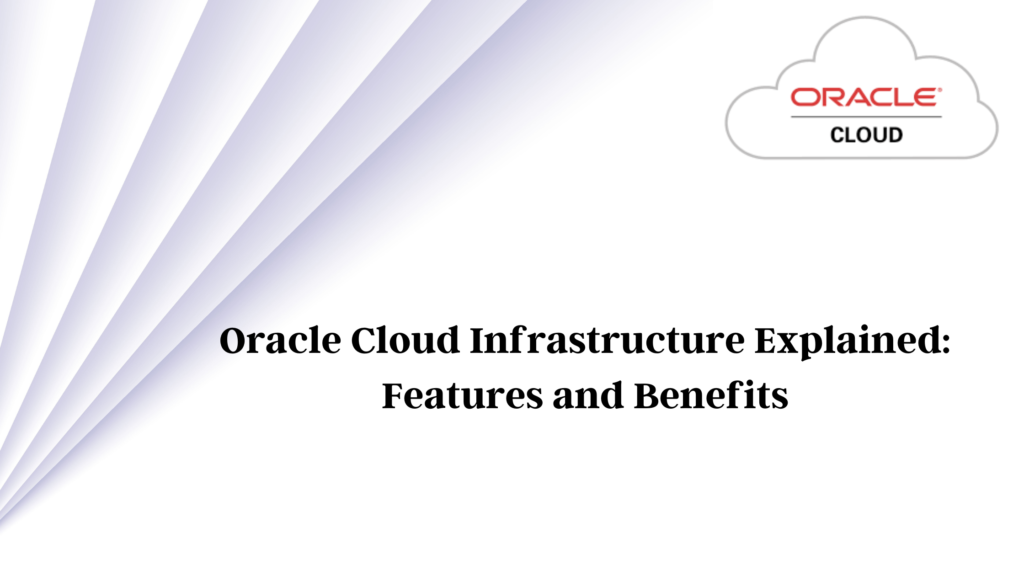Cloud Infrastructure: Accelerating Innovation and Growth

Introduction: In the rapidly evolving world of cloud computing, Oracle Cloud Infrastructure (OCI) has emerged as a robust and feature-rich platform for organizations seeking scalable, secure, and high-performance cloud services. With a wide range of offerings and cutting-edge technologies, OCI empowers businesses to drive innovation, streamline operations, and achieve digital transformation. This blog post will provide a comprehensive overview of Oracle Cloud Infrastructure, highlighting its key features, benefits, and use cases.
1. What is OCI?
OCI stands for Oracle Cloud Infrastructure. It is a comprehensive cloud computing platform offered by Oracle Corporation. OCI provides a wide range of cloud services and solutions, including infrastructure as a service (IaaS), platform as a service (PaaS), and software as a service (SaaS).
OCI is designed to deliver high-performance, scalable, and secure cloud solutions for businesses of all sizes. It offers a global network of data centers, regions, availability domains, and fault domains, ensuring high availability and data redundancy. With OCI, organizations can deploy and manage their applications, store and process data, run workloads, and leverage advanced technologies such as artificial intelligence, machine learning, and blockchain.
Oracle Cloud Infrastructure offers a comprehensive suite of services, including compute instances, storage options, networking capabilities, database solutions, security features, developer tools, integration services, and more. It aims to empower businesses with the tools and resources needed to accelerate innovation, enhance operational efficiency, and drive digital transformation in the cloud.
2. Key Features and Components:
- Global Infrastructure: Regions, Availability Domains, and Fault Domains
- Compute Services: Bare Metal Instances, Virtual Machines, and Container Engine
- Networking: Virtual Cloud Networks, Load Balancers, and DNS Services
- Storage Services: Object Storage, Block Volumes, and File Storage
- Database Services: Autonomous Database, Exadata Cloud Service, and Database Backup
- Identity and Access Management: User Management, Roles, and Policies
- Security and Compliance: Network Security, Encryption, and Compliance Certifications
- Integration Services: Messaging, Streaming, and Event Hub
- Developer Tools: Developer Studio, Functions, and API Gateway
3. Benefits of Oracle Cloud Infrastructure:
- Scalability and Elasticity: Flexibility to scale resources up or down based on demand
- Performance and Reliability: High-performance computing, low-latency networking, and SLAs
- Security and Compliance: Robust security features and compliance certifications
- Hybrid Cloud Capabilities: Integration with on-premises infrastructure and other cloud providers
- Cost Optimization: Pay-as-you-go pricing model and resource optimization tools
- Advanced Technologies: Integration with AI, machine learning, and blockchain services
4. Use Cases and Industries:
- Enterprise Applications: Hosting business-critical applications on OCI
- Data Analytics and Big Data: Running data-intensive workloads and analytics on OCI
- DevOps and Continuous Integration/Continuous Deployment (CI/CD): Leveraging OCI for agile development and deployment
- High-Performance Computing (HPC): Utilizing OCI’s compute and networking capabilities for HPC workloads
- Disaster Recovery and Business Continuity: Implementing resilient and secure DR solutions on OCI
- Startups and SMBs: Cost-effective cloud solutions for emerging businesses
5. Conclusion: Summarize the key points discussed in the blog post and reiterate the value and potential of Oracle Cloud Infrastructure in enabling organizations to achieve their cloud computing goals.
By providing a comprehensive overview of Oracle Cloud Infrastructure, this blog post aims to equip readers with the knowledge to understand its capabilities, advantages, and use cases. Whether it’s hosting enterprise applications, driving data analytics, or enabling rapid innovation, OCI offers a powerful and scalable cloud platform to meet the evolving needs of modern businesses.

Leave a Reply